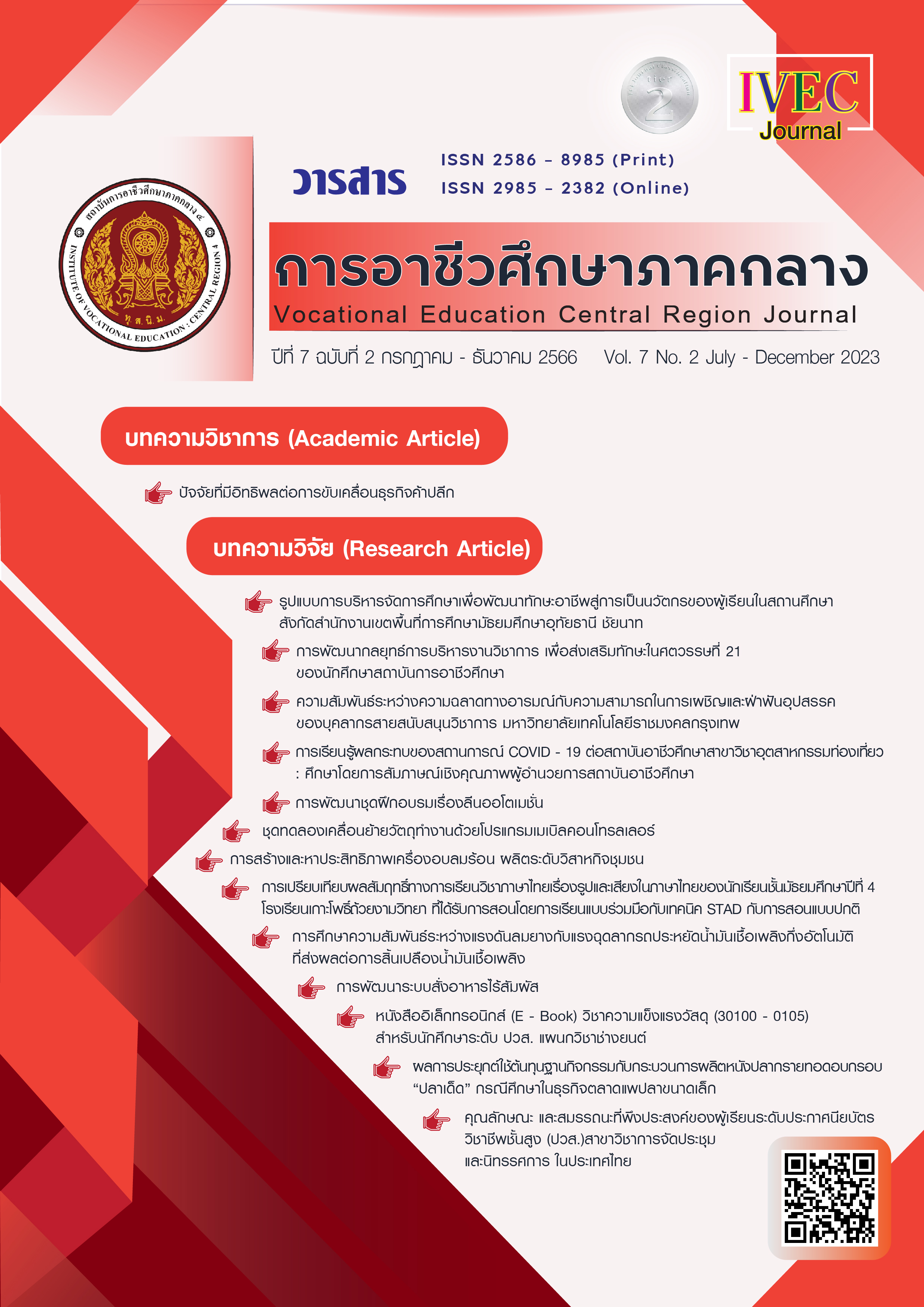Relationship Between Emotional Quotient with Adversity Quotient of Academic Support Personnel of Rajamangala University of Technology Krungthep
Main Article Content
Abstract
This study aimed 1) to study emotional quotient and adversity quotient and 2) to study the canonical correlation analysis between emotional quotient and oadversity quotient of academic support personnel of Rajamangala University of Technology Krungthep. The samples were support staff. Using a convenience sampling method , 210 people were randomized Conducted data collection by using questionnaires for online research with Google Form and the data were analyzed using statistics , namely percentage , means , standard deviation and canonical correlation analysis. The research results were as follows : 1) The emotional quotient and adversity quotient of academic support personnel were in relatively high level. 2) The canonical correlation analysis showed that the emotional quotient correlated with the adversity quotient , the canonical correlation coefficient was 0.632 that explained the correlation between canonical variables at 67.60% and 3) The canonical loading of emotional quotient was between |0.115| - |0.674| consisted of self - awareness , self-regulation , self - motivation , empathy and social - skills , respectively. The canonical loading of adversity quotient was between |0.228| - |0.323| consisted of control , endurance , reach and Ownership , respectively. Therefore , the organization the results can be applied to reinforce the emotional quotient for supporting adversity quotient of personnel that is vital characteristics for service behavior of academic support personnel of the university
Article Details

This work is licensed under a Creative Commons Attribution-NonCommercial-NoDerivatives 4.0 International License.
|
บทความ ข้อมูล เนื้อหา รูปภาพ ฯลฯ ที่ได้รับการตีพิมพ์ในวารสาร การอาชีวศึกษาภาคกลาง ถือเป็นลิขสิทธิ์ของวารสารการอาชีวศึกษาภาคกลางหากบุคคลหรือหน่วยงานใดต้องการนำทั้งหมดหรือส่วนใดส่วนหนึ่ง ไปเผยแพร่ต่อหรือเพื่อกระทำการใด ๆ กองบรรณาธิการไม่สงวนสิทธิ์ ในการคัดลอกบทความเพื่อการศึกษาแต่ให้อ้างอิงแหล่งที่มาให้ครบถ้วน สมบูรณ์ สงวนสิทธิ์ โดย สถาบันการอาชีวศึกษาภาคกลาง 4 ที่ตั้ง 90 ถนนเทศา ตำบลพระปฐมเจดีย์ อำเภอเมือง จังหวัดนครปฐม โทรศัพท์ 034 242 856 , โทรสาร 034 242 858 ISSN : 3056-9176 (print) ISSN : 2985-2382 (online) |
References
นิดา แซ่ตั้ง. (2555). ความฉลาดทางอารมณ์ และความฉลาดในการเผชิญอุปสรรคที่มีผลต่อการทำงานของพนักงานธนาคารพาณิชย์ในกรุงเทพมหานคร. ปริญญานิพนธ์ บธ.ม. (การจัดการ). กรุงเทพฯ : บัณฑิตวิทยาลัย มหาวิทยาลัยศรีนครินทร์วิโรฒ.
บุญชม ศรีสะอาด. (2556). วิธีการทางสถิติสำหรับการวิจัย เล่ม 1. พิมพ์ครั้งที่ 5. กรุงเทพฯ : สุวีริยาสาส์น.
ภัคสกุล นาคจู. (2557). ความรู้เบื้องต้นเกี่ยวกับอารมณ์, พิมพ์ครั้งที่ 2. กรุงเทพฯ : หจก.ภัคสุภรณ์การพิมพ์.
วศิน ตัณเกยูร และรัชนีวรรณ วนิชย์ถนอม (2563). ความสัมพันธ์ระหว่างความสามารถในการเผชิญและฟันฝ่าอุปสรรค ความฉลาดทางอารมณ์ และความพึงพอใจในงานของนักธุรกิจเครือข่ายบริษัทการตลาดเครือข่ายแห่ง หนึ่ง โดยมีพันธสัญญากับเป้าหมายเป็นตัวแปร สื่อ. วารสารมนุษยศาสตร์และสังคมศาสตร์ วไลยอลงกรณ์ ในพระบรมราชูปถัมภ์, 15(2), หน้า 170 - 185.
ศักดิ์ชัย จันทะแสง. (2559). โมเดลความสัมพันธ์เชิงสาเหตุระหว่างความฉลาดทางอารมณ์และการรับรู้ความยุติธรรมในองค์การที่ส่งผลต่อพฤติกรรมการเป็นสมาชิกที่ดีต่ององค์การของบุคลาการสายสนับสนุนมหาวิทยาลัยเทคโนโลยีราชมงคลกรุงเทพ. วารสารปัญญาภิวัฒน์. 8(พิเศษ), หน้า130 - 144.
ศักดิ์ชัย จันทะแสง. (2563). ความสัมพันธ์ระหว่างความฉลาดทางอารมณ์ พฤติกรรมการเป็นสมาชิกที่ดีต่อองค์การที่ส่งผลต่อความสุขในการทำงานของบุคลากรสายสนับสนุนมหาวิทยาลัยเทคโนโลยีราชมงคลกรุงเทพ. 7(2), หน้า 115 - 128.
ศรัณย์ พิมพ์ทอง. (2556). ปัจจัยที่มีอิทธิพลต่อการคงอยู่ในองค์กรของพนักงานมหาวิทยาลัยสายวิชาการในประเทศไทย. วารสารบริหารธุรกิจ คณะพาณิชยศาสตร์และการบัญชี มหาวิทยาลัยธรรมศาสตร์, 37(142), หน้า 16 - 32.
สมหญิง จันทรุไทย และเกียรติศักดิ์ อิชยานันท์. (2560). ความฉลาดทางอารมณ์และความสามารถในการเผชิญและฟันฝ่าอุปสรรคที่มีผลต่อความสำเร็จในการปฏิบัติงานของครูในสถานศึกษาขั้นพื้นฐาน เขตกรุงเทพมหานคร และปริมณฑล. วารสารสถาบันวิจัยญาณสังวร มหาวิทยาลัยมหามกุฏราชวิทยาลัย, 8(2), หน้า 189 - 198.
สมพร ปานยินดี. (2559). ผลกระทบของความสามารถในการฝ่าฟันอุปสรรค ความฉลาดทางอารมณ์ที่มีต่อความมุ่งเน้นความเป็นผู้ประกอบการและ ความสำเร็จของผู้ประกอบการเจนเนอเนชันวาน. วารสารมหาวิทยาลัยศิลปากร ฉบับภาษาไทย, 36(3), หน้า 37 - 68.
สุมามาลย์ ปานคำ และ หทัยชนก หวังวงศ์เจริญ. (2559) การวิเคราะห์สหสัมพันธ์คาโนนิคอลระหว่างความฉลาดในการฟันฝ่าอุปสรรคและความฉลาดทางอารมณ์ของนักศึกษา มหาวิทยาลัยรังสิต. การประชุมวิชาการระดับชาติ มหาวิทยาลัยรังสิต ประจำปี 2559, หน้า 1089 - 1099.
สุวิมล ติรกานันท์. (.(2555) การวิเคราะห์ตัวแปรพหุในงานวิจัยทางสังคมศาสตร์ (พิมพ์ครั้งที่ 2). กรุงเทพฯ : โรงพิมพ์แห่งจุฬาลงกรณ์มหาวิทยาลัย.
Best, J. W., & Kahn, J. V. (1998). Research in education (8th ed.). Boston: Allyn & Bacon.
Cheanchana, C. (2015). Using multivariate statistics research: Designing, analyzing, and interpreting. Bangkok: King Mongkut’s University of Technology North Bangkok. Cooper, D. R., Schindler, P. S., & Sun, J. (2006). Business research methods (9th Ed.). New York : McGraw-hill.
Goleman, D. (1998). Working with Emotional Intellgence. New York: Bantam Books. Hanifa, Y. (2017). Emotional quotient dan adversity quotient dengan kecemasan menghadapi dunia kerja. Psikoborneo: jurnal ilmiah psikologi, 5(1), pp. 25-33.
Kasapi, Z. and Mihiotis, A. (2014). Emotional Intelligence Quotient and Leadership Effectiveness in the Pharmaceutical Industry: A New Template. International Journal of Business Administration, 5(1), pp. 15 - 26.
Marques, J. (2007), "Leadership: emotional intelligence, passion and what else?" Journal of Management Development, 26, (7), pp. 644 - 651.
Miller, J. (2017) The Role of Intentional Reflective Practice and Mindfulness in Emotional Self - Regulation for Library Administrators", Emotion in the Library Workplace Advances in Library Administration and Organization, 2(37), pp. 203 – 229.
Nunnally, J. C. (1978) Psychometric theory (2nd Ed.). New York: McGraw - Hill.
Puspitacandri, A., Soesatyo, Y., Roesminingsih, E., & Susanto, H. (2020). The Effects of Intelligence, Emotional, Spiritual and Adversity Quotient on the Graduates Quality in Surabaya Shipping Polytechnic. European Journal of Educational Research, 9(3), pp. 1075 - 1087.
Rovinelli, R., & Hambleton, R. K. (1976). On the use of content specialists in the assessment of criterion- referenced test item validity. Washington, D.C.: ERIC.
Salovey, P. and J.P. Mayer. (1990). Emotional Intelligence: Imagination, Cognition, and Personality. New York: Harper.
Singh, S., & Sharma, T. (2018, September). Affect of emotional intelligence on adversity quotient of Indian managers. In AIP Conference Proceedings (Vol. 2016, No. 1, p. 020135). AIP Publishing LLC. Stoltz, P.G. (1997). Adversity Quotient: Turning Obstacles into Opportunities. The United States of America: John Wiley & Sons.
Themistocleous, M., Irani, Z. and Love, P. E. D. (2005). Developing E - Government Integrated Infrastructures: A Case Study, Proceedings of the 38th Annual Hawaii International Conference on System Sciences, Big Island, Hawaii, IEEE, 1 - 10.
Wagner, R. K., & Sternberg, R. J. (1985). Practical intelligence in real - world pursuits: The role of tacit knowledge. Journal of Personality and Social Psychology. 49(1), pp. 436 - 458.
Zhao, Y., Sang, B., & Ding, C. (2021). The roles of emotional intelligence and adversity quotient in life satisfaction. Current Psychology, pp. 1 - 10.


